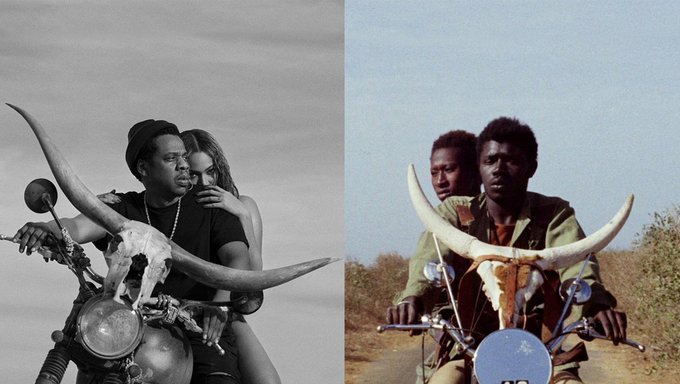Beyonce Steals The Film "Black Panther" For
Illegal Use To Make Her Documentary Film "Black is King"

Beyonce
As stated on the site last week, Beyonce's 2020 documentary film "Black
is King" is about a
young African king
trying to
reclaim his throne
via his
ancestors and childhood love.
Those of you who have seen the billion selling 2018 film "Black Panther"
will recognize Beyonce's "Black Is King" as a rip-off of the "Black
Panther" plot line.
In "Black Panther" the
young African prince turned king
(T'Challa) loses the throne of the fictional African nation "Wakanda"
and seeks to
reclaim his throne
with the help of his
ancestors
and childhood love
(Nakia played by Academy Award winner Lupita Nyong'o).
The lead single from Beyonce's "Black is
King" is called "Black Parade" which is even close in
lettering to "Black Panther has already flopped on the
charts and in sales last month. The song flopped in one
week. Once again, people are boycotting her and others
in her Hollywood cult for stealing.
Today, I have done a quick comparison of
"Black Panther" and Beyonce's subsequent, later filmed
and released theft "Black Is King" to show the
infringements. I've done it almost storyboard style to
show you the thefts of copyright from a real writer and
director's perspective.
I have studied filmmaking since I was 14
(and began copyrighting at that age as a child prodigy)
and never have I seen such brazen and arrogant
mimicking, copying and foolishnesses as I've seen in
"Black Is King." Beyonce and Jay Z are two crazy, lame
brained, ignorant idiots who've stolen and devalued a
billion dollar film clearly, thinking it will make them
a billion dollars as well (it won't) like two vile,
thieving criminals.
Here are the similarities to "Black
Panther" that I found from the trailer alone of "Black
Is King" which lets me know the full documentary is even
worse and more laden with thefts of copyright:
RELATED READING
Beyoncé’s new film ‘Black Is King’ is stirring up
controversy
Posted on Friday, 24 July 2020 14:24 -
One year after the release of the album “The Lion King:
The Gift”, Queen Bey is about to unveil a new Disney
production. Made in the style of a long, meticulously
crafted music video, this condensed version of Black
history is already proving to be divisive.
“The film is not available anywhere
before its release,” warns a press officer about
Beyoncé’s new visual album, Black Is King, which is set
to be released on Disney+ on 31 July. But all it took to
attract the ire of African-American feminists,
especially the youngest among them, was the film’s
one-and-a-half-minute trailer.
Criticism of the work is going strong
and has a radical bent, with detractors calling out the
trailer for romanticising Africa as well as for its
cultural syncretism, pre-colonial aesthetic, cultural
appropriation and “Wakandafication” (in reference to the
Kingdom of Wakanda, a fictional African country depicted
by the Marvel movie Black Panther).
Jade Bentil, a Black feminist historian
and PhD researcher at the University of Oxford,
commented in a tweet: “The repeated tropes/symbolic
gestures that homogenise & essentialise thousands of
African cultures in service of securing the terrain for
Black capitalist possibilities & futures is tired.”
Judicaelle Irakoze, a self-proclaimed
Afro-political feminist who is followed by more than
30,000 people on Twitter, expressed a similar point of
view, disappointed that Beyoncé “use[s] her power and
status […] to glorify africanness rooted in power game[s]
against the white gaze.”
Just a few seconds into Black Is King’s
meticulously crafted trailer, Beyoncé appears astride a
horse, wearing an outfit made of animal hide and a crown
of zebu horns. This iconographic imagery is reminiscent
of the film Touki Bouki directed by Senegalese filmmaker Djibril Diop Mambéty in 1973. The singer had previously
borrowed this aesthetic when advertising her “OTR II”
tour with Jay-Z in 2018, without giving credit to the
original artist.
The trailer shows Queen Bey glittering
in all her glory, with layered necklaces wrapped around
her neck and sparkling glasses framing her face, giving
off an on-screen presence that could be likened to a
bling-bling version of the Dahomey Amazons (an
all-female military army of the Republic of Benin).
Needless to say, this aestheticising phantasmagoria
created in an Afrofuturist vein is not universally
liked.
However, according to the journalist
Sophie Rosemont, it’s precisely “the role of a pop star
to make a statement through an aesthetic prism. Even if
the statement is political, it has to be packaged as
beautiful and spark people’s imaginations,” says the
author of the French book Black Power, l’avènement de la
pop culture afro-américaine (Black Power: the Advent of
African-American Pop Culture), to be published in
October by GM Éditions.
In a post on Instagram, the singer said
that she “wanted to present elements of Black history
and African tradition, with a modern twist and a
universal message.”
“It is too bad that Beyoncé doesn’t seem
to take contemporary Africa into account in her film and
has rooted its imagery in a tribal Africa. Other
musicians before her, such as free jazz artists from the
1950s and 1960s, have already revisited these roots,”
adds Rosemont. “Since that time period, pop culture has
been so deeply influenced by ancestral reference points
that it’s really about time to move on to something
else.”
Biblical and Yoruba symbolism
“The ancestors never left you,” chants
the 38-year-old star in a spoken-word style summoning
the negro spiritual songs sung by slaves deported to the
United States in the nineteenth century. Wearing a white
dress, Beyoncé evokes a sort of Madonna as she cradles a
newborn baby on the seashore. The sequence is a cross
between biblical and Yoruba symbolism.
Black Is King has a soundtrack featuring
songs from the album “The Lion King: The Gift”, all of
which were performed by Nigerian, South African,
Ghanaian and Cameroonian artists.
Kinitra Brooks, a professor of
African-American literature specialising in Black
feminist theory, notes in her work The Lemonade Reader:
Beyoncé, Black Feminism and Spirituality, published in
2019, the prevalence of references to African ancestral
religions in the film Lemonade, a companion to one of
Beyoncé’s most politically-charged albums (released in
2016) which overflows with protest songs about Black and
African pride.
In one of the sequences, Queen Bey has
fun playing the role of the Yoruba deity Oshun, the
goddess of love and fertility, protector of pregnant
women and children, and queen of freshwater.
Brooks writes in her book: “The liquid
element represents a literal or symbolic return to the
Atlantic Ocean waters which are part of the ancestral
past and collective memory. The presence of water […]
points out […] to the Atlantic journey from Africa to
the Americas.”
This bridge between Africa’s history and
diaspora has continued to influence Beyoncé’s visual
identity and sound since 2016. The problem is that this
age-old narrative has gone stale, especially if it is
not backed up with concrete action.
Black rights
Another criticism the R&B queen has
faced is that she does not tour often enough in Africa.
However, her focus has been on involving local stars in
her projects to showcase contemporary African culture.
As Rosemont points out, whereas “Michael
Jackson and Rihanna sampled a line from the hit song
‘Soul Makossa’ by Cameroonian musician Manu Dibango
without properly crediting him in their respective
compositions”, Black Is King has a soundtrack featuring
songs from the album “The Lion King: The Gift”, all of
which were performed by Nigerian, South African,
Ghanaian and Cameroonian artists...
https://www.theafricareport.com
Tina Knowles delivers hard-hitting response to critics who
claim Beyonce's visual album Black Is King appropriates African
culture: 'She has a right to her heritage'
Published: 20:01 EDT, 3 July 2020 | Updated: 03:26
EDT, 4 July 2020 - The proud mother took to Instagram on
Friday and hit back at critics who claim the pop superstar is
'appropriating' African culture in her upcoming visual album.
Black Is King, which is based on the soundtrack she
produced for the 2019 animated remake of The Lion King, follows the
story of a young king's 'transcendent journey through betrayal, love
and self-identity,' while ultimately celebrating 'Black resilience
and culture.'
Proud mother: Tina Knowles came to the defense of
her daughter and hit back at critics who accused Beyonce of
'appropriating' African culture in her upcoming visual album, Black
Is King.
The criticism from several academics began shortly
after last week's release of the trailer, which features Beyonce and
an array of Black creators and talent --some of which are from
Africa -- dressed in traditional African garb, complete with
biblical references and Beyonce's narration and soothing vocals...
https://www.dailymail.co.uk
Beyonce releases the new Black Is King visual album trailer...
after facing accusations of appropriating African culture in new
project
Published: 12:46 EDT, 19 July 2020 | Updated: 15:02
EDT, 19 July 2020 - She was recently criticized for appropriating
African culture. But the outlandish remarks haven't kept Beyonce
down, releasing the second trailer to her latest visual album, Black
Is King.
The 38-year-old beauty was seen in various looks
while narrating the darkly lit upcoming spectacular. New trailer:
Beyonce stunned in various looks including a catsuit for the latest
trailer for her Black Is King visual album that was released on
Sunday morning...
https://www.dailymail.co.uk
RELATED ARTICLES
Beyonce Steals Preexisting 'Black
Panther' Movie Scene For Scene In Her Rip Off Documentary 'Black Is
King' (Photos)
Beyonce's Rip Off Documentary 'Black
Is King' Flops Costing Disney Millions Of Dollars In Losses
Beyonce Steals From 'Black Panther'
Movie For Her New Documentary And Album 'Black Is King'
Beyonce And Jay Z Steal From African Film For
Tour Poster

Beyonce and Jay Z (pictured left in 2018) keep stealing
from the 1973 African film "Touki Bouki" (pictured right)
giving no credit or payment to the copyright
owner/writer/director, which has caused Africans to slam
her all over the internet. Beyonce stole from the film
for her copyright infringing documentary "Black is King"
and also unlawfully took from it for her "On The Run"
tour poster.
Beyonce Steals From the legendary artists Sam
Cooke and En Vogue
My dad played "Wonderful World" so many times in the
house and car, while I was growing up, when I heard the Beyonce song, I
instantly recognized the infringement. A few of the copyright infringing lyrics are:

